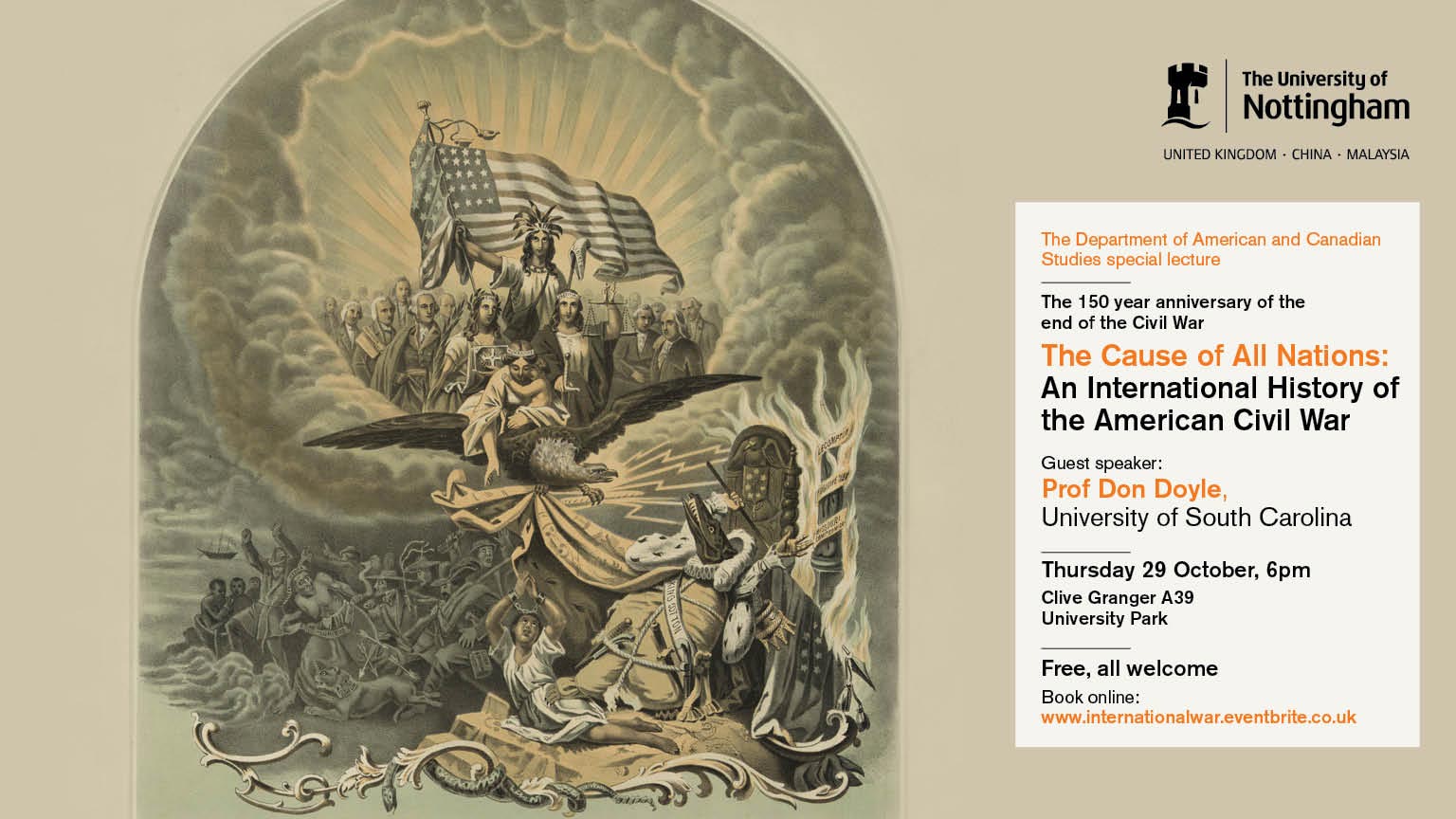
October 23, 2015, by Guest blog
Race and Rights: The Cause of All Nations
An event to mark the end of the 150th anniversary period for the American Civil War.
Thursday 29 October 2015 (18.00 – 19.00)
A39, Sir Clive Granger Building, University Park
Free and open to all, but please register here.
Marking the end of the 150th anniversary period for the Civil War (2011-2015), please join the Department of American and Canadian Studies for a special lecture by internationally renowned scholar Don Doyle. Professor Doyle’s talk and discussion, chaired by PhD researcher James Brookes, will offer an international history of the war as a global referendum on the viability of republicanism and mass suffrage following the failure of the revolutions of 1848 – a referendum acted out on a radically new field of battle thanks to the development of an international press. Neither the Union nor the Confederacy comes out looking good in Doyle’s account: the South’s struggle for recognition was hampered by incompetent diplomats; the North, insisting to Europeans that the war was precipitated by a legalistic disagreement about constitutional law, failed to capitalise on the powerful antislavery sentiments across the Atlantic until it was nearly too late.
Professor Doyle will contextualise these duelling diplomatic missions within the larger machinations of European rulers: to quell dissent at home and reignite their own imperialist ambitions across the Atlantic. French and Spanish imperialists perceived an opportunity to re-establish empires in South America whilst the United States was unable to uphold the commitments of the Monroe Doctrine. Some British political factions, wary of popular sovereignty, waited eagerly for the fledging republican nation to bring about its own demise. Others viewed the war as precursor to universal suffrage. More than any previous scholar, Doyle will tell the story of how the American Civil War was perceived, debated and reacted to abroad, and how that reaction shaped the course of the war at home.
Doyle aligns with Civil War historians who reposition the previously neglected and peripheral immigrant soldier in our understanding the conflict. Foreign-born and second-generation immigrant soldiers, notably Germans and Irish, contributed greatly to the Union war effort. Though thousands fought for the Confederacy, it is estimated that foreign soldiers formed as much as 40% of the Union’s armed forces. Without them, they might never have won. Though many undoubtedly fought for free passage to the United States, recruitment bounties, and the rewards of the Homestead Act, as many were acutely aware of the political and social reverberations of the conflict. Their contribution underscored the conflict as an international struggle.
Don Doyle is the McCausland Professor of History at the University of South Carolina and Director of ARENA, the Association for Research on Ethnicity and Nationalism in the Americas. His many books include Nashville in the New South (1985), New Men, New Cities, New South (1990), The South as an American Problem (1995), Nations Divided: American, Italy, and the Southern Question (2002), Nationalism in the New World (2006), Secession as an International Phenomenon: From America’s Civil War to Contemporary Separatist Movements (2010), and The Cause of All Nations: An International History of the American Civil War (2014). He draws his lecture from his latest book, which has received great praise from renowned Civil War historians such as Pulitzer Prize-winning James M. McPherson and Bruce Levine. Scholars have hailed The Cause of All Nations for its concise yet panoramic view of the Civil War’s impact on world history.
James Brookes is a PhD student in the American and Canadian Studies department, where he is writing a dissertation on the visual culture of American Civil War soldiers. He recently completed an MRes thesis on photographic portraiture’s relationship with Union citizen-soldiers. He is a research associate with the Centre for Research in Race and Rights.
No comments yet, fill out a comment to be the first

Leave a Reply